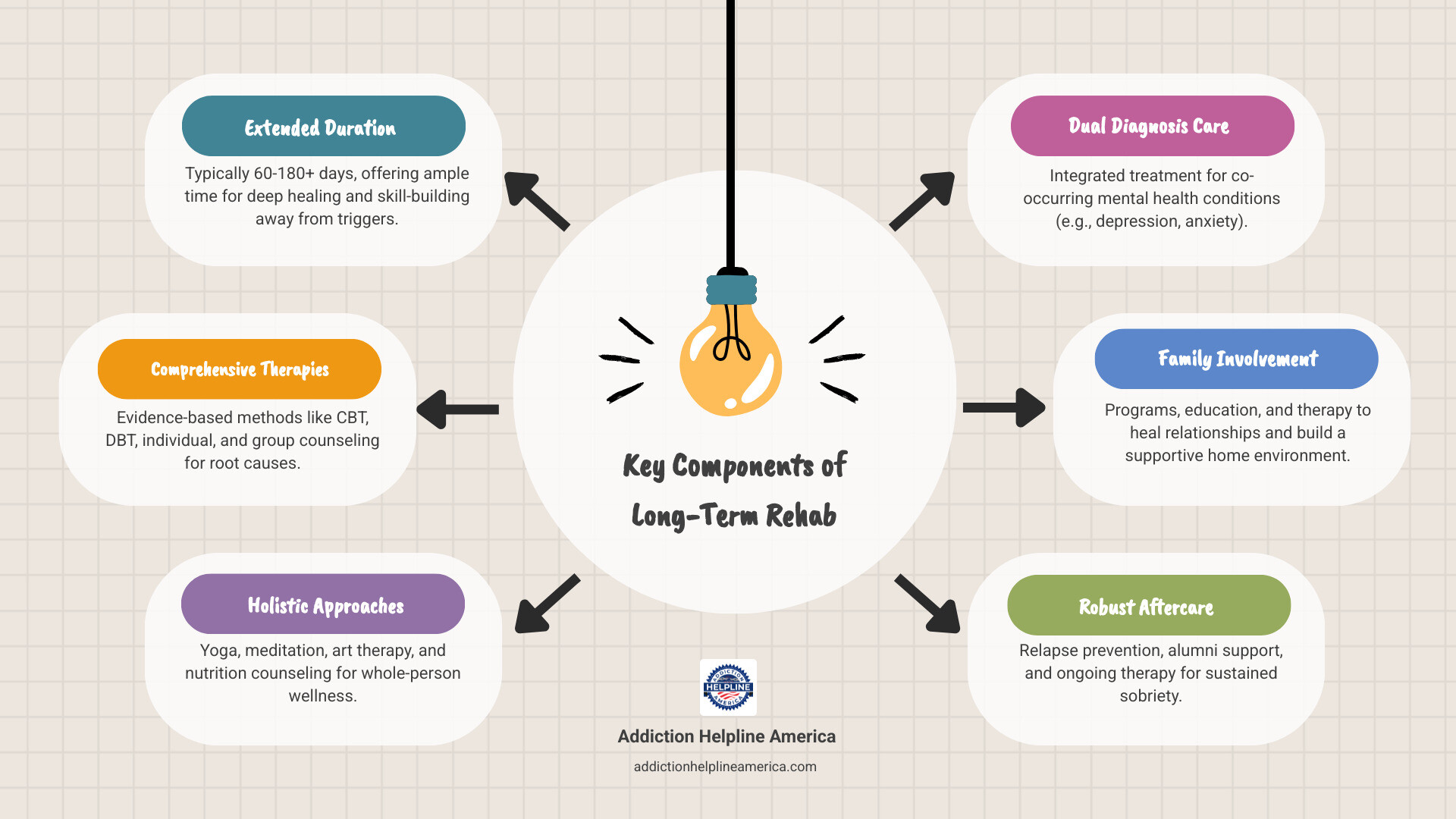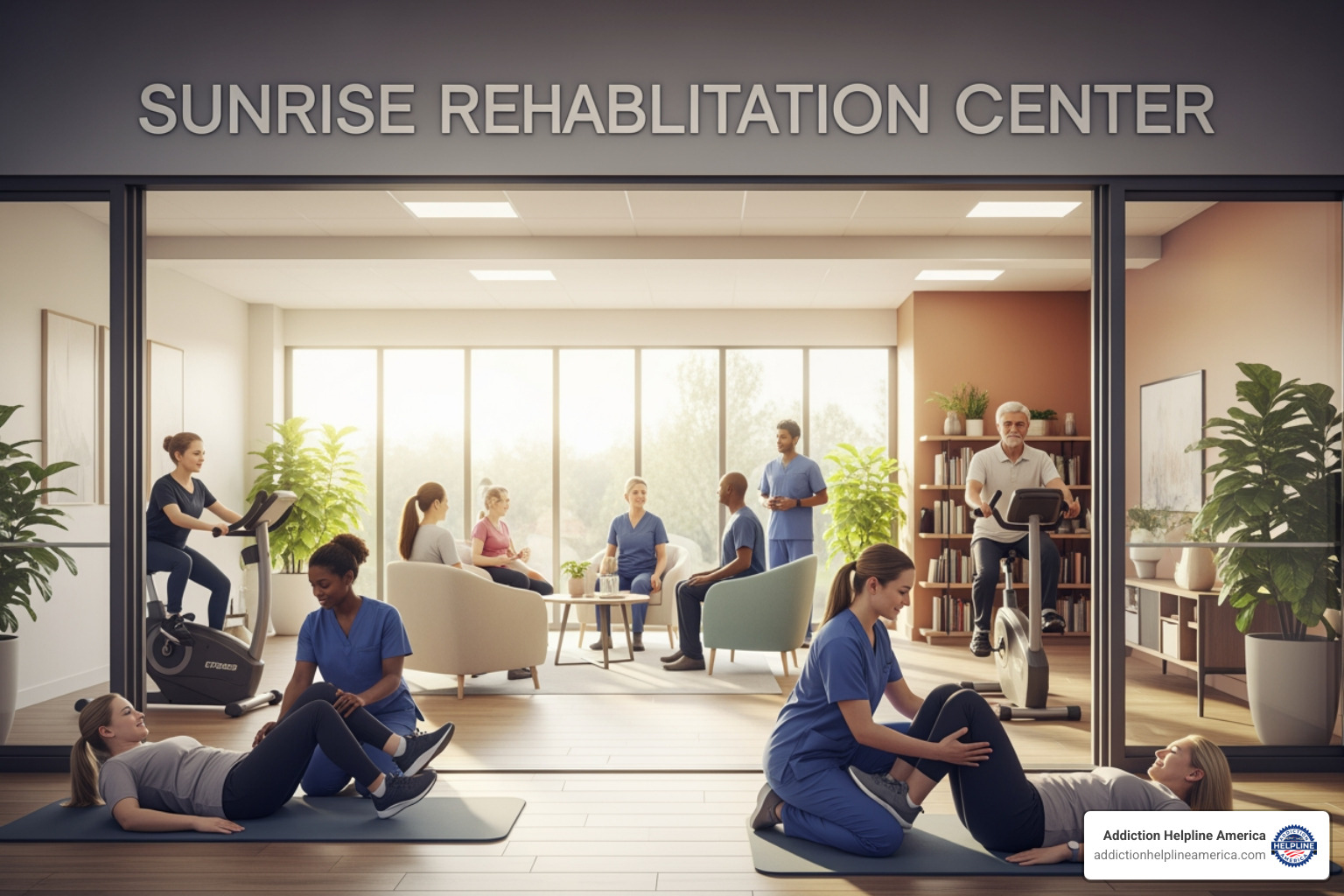
Understanding Long-Term Rehab: Your First Step Toward Lasting Recovery
Long term rehab near me is a residential addiction treatment program that typically lasts 60 to 90 days or longer, providing intensive therapy, medical support, and life skills training in a structured, safe environment away from everyday triggers and stressors.
Quick Answer: How to Find Long-Term Rehab Near You
- Contact a confidential helpline – Get immediate guidance from trained professionals.
- Verify your insurance coverage – Understand your benefits, as private facilities can cost $10,000-$30,000 or more.
- Look for accredited facilities – Ensure they’re certified by recognized organizations like CARF or The Joint Commission.
- Evaluate treatment approaches – Confirm they offer evidence-based therapies (CBT, DBT) and treat co-occurring mental health disorders.
- Ask about aftercare support – Quality programs provide alumni groups, continuing therapy, and relapse prevention planning.
When you’re struggling with addiction—or watching someone you love battle it—the path forward can feel unclear. You might wonder if you need more than a 30-day program, especially after previous attempts at recovery. Long-term rehab offers something different: extended time away from destructive environments, deeper exploration of addiction’s root causes, and comprehensive skill-building for sustained recovery.
Research shows that long-term programs provide more therapy, counseling, and aftercare support than shorter alternatives. They give you the time and space needed to truly heal—not just detox, but rebuild your life. If you’re dealing with chronic relapse, co-occurring mental health issues, or haven’t found success in shorter programs, long-term residential treatment may be the solution.
At Addiction Helpline America, we’ve spent years connecting individuals and families with the right long-term rehab programs across the United States, understanding that finding a quality facility requires expert guidance. We’re here to walk you through every step, from understanding what long-term rehab means to choosing the facility that’s right for you.

Long term rehab near me terms to remember:
What is Long-Term Rehab and Who is it For?
If you’re researching treatment options, you’re probably feeling overwhelmed. Let’s make this simple. Long-term rehab is a residential treatment program where you live at a facility for an extended period—typically 60, 90, or even 180+ days. That might sound like a long time, but that’s exactly the point.
Unlike 30-day programs that focus mainly on detox and basic coping skills, long-term rehab gives you something invaluable: time. Time to step away from triggers, dig into the real reasons behind your addiction, and practice new ways of living until they become second nature.
Think of it like this: a broken bone needs time to mend, followed by physical therapy to rebuild strength. Long term rehab near me works the same way for addiction. It’s not a quick fix—it’s comprehensive healing in a structured, safe environment where you can focus entirely on getting better without the chaos of daily life.

The benefits go beyond just more days in treatment. Long-term programs offer a wider variety of therapeutic approaches, from evidence-based methods like Cognitive Behavioral Therapy (CBT) and Dialectical Behavior Therapy (DBT) to holistic practices like yoga and mindfulness. You’ll work with counselors who have time to get to know you and receive thorough aftercare planning—the roadmap that helps you stay sober after you leave.
Call Now – Your Journey to Recovery Begins Today!

Take the first step towards a healthier life! Call now to connect with our compassionate team and start your recovery journey today. Your path to healing awaits!
Our recovery specialists are available 24/7 to provide support, and all calls are confidential and free. Reach out anytime – we’re here to help!
This extended time also allows your brain chemistry to normalize as new, healthy habits take root. You build genuine friendships with others in recovery and refind who you are without substances defining you.
| Feature | Short-Term Rehab (e.g., 28-30 days) | Long-Term Rehab (e.g., 60-180+ days) |
|---|---|---|
| Duration | Brief, focused on immediate stabilization and detox | Extended, allowing for deeper healing and skill-building |
| Therapy Depth | Introduction to therapies, foundational work | In-depth exploration of root causes, various methodologies |
| Environment | Structured, but quicker return to external triggers | Immersive, sustained separation from destructive environments |
| Relapse Prevention | Basic strategies, early aftercare planning | Comprehensive strategies, extensive aftercare, and community integration |
| Focus | Detoxification, initial coping skills, crisis intervention | Holistic healing, life skills training, sustained behavioral change |
| Cost | Generally lower upfront | Higher upfront, but potentially better long-term outcomes |
Signs You or a Loved One Might Need Long-Term Rehab
How do you know if long-term rehab is the right choice? There are some clear indicators that a longer program is necessary.
If you’ve tried shorter treatment programs before and relapsed, it’s not a personal failure. It simply means your addiction needs more time and deeper work. Recognizing that a 30-day program wasn’t enough is a sign of wisdom, not weakness.
Years of heavy substance use create deeply ingrained patterns. Solveing those patterns and building new ones takes time. You can’t rush fundamental change.
Co-occurring mental health disorders are incredibly common with addiction. If you’re dealing with depression, anxiety, PTSD, or other mental health challenges, you need integrated treatment that addresses both issues at once. Long-term programs are specifically designed for this dual diagnosis approach.
Your home environment matters. If returning home means facing active users, high-stress situations, or constant triggers, you’re being set up for relapse. Long-term rehab provides a protected space to heal and build strength before facing those challenges.
Previous attempts at short-term treatment that didn’t lead to lasting sobriety tell you that you need more time. There’s no shame in that. What matters is finding what works for you, and if shorter programs haven’t worked, it’s time to consider a longer stay.
The bottom line? Long term rehab near me isn’t about punishment. It’s about giving yourself the best possible chance at a life free from addiction—and sometimes that requires a bigger investment of time upfront for a lifetime of freedom.
What to Expect: Services, Therapies, and Aftercare in Long-Term Rehab
Committing to a long-term residential program means beginning a transformative journey. Long-term rehab centers offer a comprehensive suite of services to treat the whole person, equipping you with the tools and support for lifelong recovery.
The journey often begins with a safe, medically supervised detox. Quality detox places provide 24/7 medical monitoring and medications to ease withdrawal symptoms. But detox is just the first step—it clears your system so the real work of recovery can begin.

Comprehensive Therapeutic Approaches
Quality programs incorporate a variety of evidence-based therapies supported by scientific research.
- Cognitive Behavioral Therapy (CBT) helps you identify and change negative thought patterns and behaviors that fuel substance abuse.
- Dialectical Behavior Therapy (DBT) is often used for co-occurring conditions, focusing on emotional regulation, distress tolerance, and mindfulness.
- Individual counseling provides a confidential space with a therapist to explore personal issues and the root causes of addiction.
- Group therapy fosters connection and community, reducing isolation by sharing experiences with peers who understand your struggles.
Many programs also integrate holistic methods that address the mind, body, and spirit. These can include yoga, art therapy, mindfulness, and nutrition counseling to promote overall well-being and help repair the damage caused by substance abuse.
Call Now – Your Journey to Recovery Begins Today!

Take the first step towards a healthier life! Call now to connect with our compassionate team and start your recovery journey today. Your path to healing awaits!
Our recovery specialists are available 24/7 to provide support, and all calls are confidential and free. Reach out anytime – we’re here to help!
Treating the Whole Person: Dual Diagnosis and Family Involvement
Addiction rarely exists in a vacuum. Many individuals also face co-occurring mental health conditions like depression, anxiety, or PTSD. This is known as a dual diagnosis. Reputable centers provide integrated care to address both the substance use and mental health disorders simultaneously, which is essential for lasting recovery. Learn more about mental health support and finding the right resources.
Family involvement is also critical, as addiction impacts the entire family system. Programs often include family therapy to rebuild trust and improve communication, along with educational workshops that teach families how to provide effective support without enabling. The goal is to create a supportive home environment and foster healing for the whole family.
Planning for Success After Treatment
Completing a residential program is the starting line of your new life. A robust aftercare plan is a crucial roadmap for navigating the transition back to everyday life.
This plan includes relapse prevention strategies, helping you identify personal triggers and develop techniques for managing cravings. Building a strong support network is also essential, which may involve 12-step programs, a sponsor, and ongoing therapy.
Continued support often includes alumni groups and transitional options like sober living homes. These services provide a vital bridge between the protected environment of rehab and the challenges of the real world, equipping you with the skills to maintain sobriety and thrive.
Your Step-by-Step Guide to Finding a Long Term Rehab Near Me
Finding the right facility can feel like a huge task, but breaking it down into smaller steps makes the process much clearer. The key is to find a program that fits your unique needs, clinical requirements, and personal goals. We’re here to help you steer the options with care and support.

How to Start Your Search for a long term rehab near me
The first step is often the hardest: taking action. But you don’t have to do it alone. Start by consulting trusted professionals. Your primary care doctor or a licensed therapist can offer referrals and guidance based on your health history.
Next, make use of online resources. State and local government health services websites are excellent starting points for finding accredited programs. For example, states like Alaska, Arkansas, Colorado, Connecticut, and Delaware all offer official resources to help residents find substance abuse or mental health treatment. You can also search the federal SAMHSA treatment locator to identify programs near you by location, services offered, and payment options.
For direct and personalized help, reputable, confidential helplines are a lifeline. We at Addiction Helpline America offer free, confidential guidance, connecting you with suitable programs from our extensive network across the United States. We’re here to listen to your story and provide personalized recommendations.
Evaluating and Choosing the Right Program
Once you have a list of potential facilities, it’s time to evaluate them carefully to ensure you choose a program that sets you up for success.
First, always look for accreditation. This means the facility has been certified by recognized bodies like CARF or The Joint Commission, indicating they meet rigorous standards for quality and patient care.
Next, consider the staff credentials. You want to ensure the facility employs licensed therapists, counselors, and medical staff with specialized training in addiction. A strong team is a sign of a quality program.
Think about the treatment philosophy of the program. Does their approach—whether it’s evidence-based, 12-step-focused, or holistic—resonate with you? It’s crucial to find a philosophy that aligns with your personal beliefs and recovery goals.
Finally, pay attention to the admissions process. A thorough pre-admission assessment is a strong indicator of a quality program. This assessment helps the facility understand your unique needs, allowing them to create a truly individualized treatment plan.
Understanding the Cost of a long term rehab near me
The financial aspect of treatment is a common concern, but it shouldn’t be a roadblock. The cost of private rehab can range from $10,000 to over $30,000 for a 60-90 day stay. Investing in long-term recovery is one of the best investments you can make in your future.
Thankfully, there are many ways to cover this cost. Most private health insurance plans offer some level of coverage for addiction treatment. It’s important to verify your benefits directly with your provider or have the rehab’s admissions team assist you. Some facilities also offer sliding scale fees based on income or provide financing and payment plans.
Our team at Addiction Helpline America is here to assist you in navigating these financial questions and connecting you with facilities that align with your budget and insurance coverage. Please, don’t let cost deter you from exploring long term rehab near me; solutions are available, and your recovery is worth it.
Call Now – Your Journey to Recovery Begins Today!

Take the first step towards a healthier life! Call now to connect with our compassionate team and start your recovery journey today. Your path to healing awaits!
Our recovery specialists are available 24/7 to provide support, and all calls are confidential and free. Reach out anytime – we’re here to help!
Conclusion: Your Path to Lasting Recovery Starts Today
The decision to seek help for addiction is one of the bravest choices you can make. Choosing long term rehab near me isn’t just about getting through the next few months—it’s about reclaiming your life and building a future you can be proud of.
As this guide has shown, long-term residential treatment provides the extended time, deeper therapeutic work, and comprehensive aftercare planning that contribute to better outcomes and lower relapse rates. Whether you’re dealing with chronic relapse, co-occurring mental health conditions, or have found shorter programs insufficient, long-term rehab offers the immersive healing environment you need.
We know that reaching out can feel overwhelming due to concerns about cost, family, or past attempts. These feelings are normal. But we want you to know: recovery is not only possible—it’s within your reach. People from all walks of life find lasting sobriety through long-term treatment every day.
You don’t have to steer this journey alone. Addiction Helpline America provides free, confidential guidance to help you find the right addiction and mental health treatment program. Our team understands the complexities of choosing a facility and can match your specific needs with the right program from our nationwide network. We’re here to listen without judgment and connect you with the comprehensive care you deserve.
The path to recovery starts with a single call. Whether you’re looking for yourself or a loved one, we’re ready to help. Don’t let another day go by wondering if things could be different. They can be.
Your future is waiting. Let’s take this first step together. Find the right addiction treatment program for you.
Our helpline is 100%
free & confidential
If you or someone you care about is struggling with drug or alcohol addiction, we can help you explore your recovery options. Don’t face this challenge alone—seek support from us.
Programs
Resources
Will my insurance
cover addiction
treatment?
We're ready to help
Find the best
drug or alcohol treatment
center
Are you or a loved one struggling with addiction? Call today to speak to a treatment expert.















